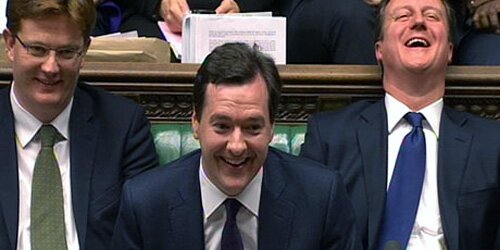Cameron big EU speech: the excerpts
8:20 am - January 18th 2013
| Tweet | Share on Tumblr |

Today was the day David Cameron was due to give his big speech on the EU.
But the whole charade has blown up in his face, because he decided to postpone the speech due to the Algerian hostage crisis (understandable) but that was over within hours of his decision.
And now the media has reported on it anyway, so there’s no element of surprise any more.
Reuters is reporting on some excerpts, though there may have been surprises not briefed in advance.
- Expected to spell out his plans to renegotiate Britain’s membership of the EU.
- To say the EU faces three major challenges: the euro zone debt crisis, faltering competitiveness and declining public support, particularly in Britain.
- To say: “I do not want that [Britain's exit] to happen. I want the European Union to be a success and I want a relationship between Britain and the EU that keeps us in it.”
- No specific mention (in excerpts given to Reuters) of a possible date of referendum on Britain’s role in Europe.
That seems to be it, unless significant parts of the speech were not briefed in advance.
Just to be clear: David Cameron will not lead the Conservatives out of Europe. He has, to his credit, taken the pragmatic route and realised too many of his party’s backers are against an exit even if his mad backbenchers want it to happen.
Or to put it another way, Cameron doesn’t spell out under what circumstances he would leave, which makes the Eurosceptic wing such as Daniel Hannan MEP and Douglas Carswell irrelevant. They can screech as much as they want but Cameron won’t be the man to take them out of Europe.
| Tweet | Share on Tumblr |  |
Sunny Hundal is editor of LC. Also: on Twitter, at Pickled Politics and Guardian CIF.
· Other posts by Sunny Hundal
Story Filed Under: Europe ,Foreign affairs ,News
Sorry, the comment form is closed at this time.
Reader comments
“They can screech as much as they want but Cameron won’t be the man to take them out of Europe.”
But Boris just might be
Or to put it another way, Cameron doesn’t spell out under what circumstances he would leave, which makes the Eurosceptic wing such as Daniel Hannan MEP and Douglas Carswell irrelevant.
It’s a bit premature, parsing a speech which hasn’t been delivered for the things which aren’t in it. But in any event, it’s blindingly obvious on what terms Cameron would leave the UK – if the renegotiated terms failed to win a referendum in the UK.
The EU (and more particularly the Eurozone) is becoming progressively tighter-knit. A banking union is coming, a fiscal union is moving from de facto to de jure reality. The EU really isn’t a customs union any more – it’s a single-currency bloc. For all the blather from everybody, there are essentially three choices for the UK.
The first is to jump aboard with both feet; accept that Britain’s place is whole-heartedly within Europe; and work to adapt our economy and laws to make them fit a continental model. The problem with this is that it would be so desperately unpopular as to lack democratic legitimacy (plus the fact that all three parties accept a referendum lock on treaty changes means that it would be impossible to get this past the people).
The second is to shrug and leave. We were never really heart and soul in the movement; never believed in Ever-Closer Union, and it’s better for both the EU and for the UK to be friendly neighbours than antagonistic spouses (see “a pro-European’s case for leaving the EU” http://www.ft.com/cms/s/0/50646880-5fd8-11e2-8d8d-00144feab49a.html#axzz2IK6m7QVt).
And the third is to ty and fudge the contradiction – OK so the Eurozone is bound on a course towards confederation, let’s try and create a space for non-Federalist European countries within the EU.
The third is what Cameron’s trying to do. Eurocrats love the metaphor of a train leaving a station – are you on or off? Well, we’ve got one leg in and one leg out and we’re hopping down the platform. Whatever else that is, it’s not a indefinitely sustainable position.
@Schmidt – Boris might indeed be, but he’ll probably be doing it from the Opposition benches, once the ‘Better Off Out’ Ukip-lite Tories have completely taken over the party (if they haven’t already).
Without clear detail on the EU reforms that Cameron wants to achieve, it is impossible to comment substantively. The Boris thing is just smoke and mirrors stuff relating more to his leadership ambitions than anything clear and constructive.
IMO all this has more to do with protecting the Conservative vote at the next general election from UKIP than renegotiating EU treaties, which will require consensus among the other 26 member states. The rational course for potential inward investors is to await clarity before making decisions to invest in Britain, which is not something most of us want to see given the warnings from NIESR about the likelihood of a triple-dip recession.
But in any event, it’s blindingly obvious on what terms Cameron would leave the UK – if the renegotiated terms failed to win a referendum in the UK.
That’s an easy one. He’ll try renegotiation, won’t get very far because Europeans don’t like him, and declare victory anyway. The referendum will be won because all three main parties as well as businesses will campaign for it. Finito.
Err, let’s be fair: the Algerian hostage crisis wasn’t over within hours. In fact, as far as we know, it’s still not over.
That Speech by David Cameron will now clash with the Inauguration of Obama’s second term, which is bound to receive more attention even in Britain.
Not as funny as when the wedding of Charles and Camilla was going to clash with the second wedding of Ken and Deirdre (but then had to be rescheduled around the old Pope’s funeral on that day).
Not far off, though. Not far off at all.
That’s an easy one. He’ll try renegotiation, won’t get very far because Europeans don’t like him, and declare victory anyway.
Heh. Ah Sunny, your insight into international diplomacy is remarkable.
@TimJ,
You’re right to question the “train leaving the station” stuff that (some, too many) of my fellow Europhiles use.
I think they’ve contributed to you talking in terms of leave/ jump in with both feet. It’s by no means a done deal that it’ll be a Swiss-style federation, at least not for the non-Eurozoners. There 10 such, I think. Denmark and Sweden don’t seem to want to leave, and they won’t join the Euro. And I don’t think you can assume the new countries in the east are all “ever closer union” types. Reckon they joined the EU more for security than anything else.
The sense that there’s an urgent question to answer is down to political factors.
I think Sunny’s view of diplomacy is probably fair enough, btw. Us of course meaning our government.
Excellent wrap-up of the three “options” by Tim J. I will use it on LinkedIn discussion groups.
When will progressives and liberals get rid of their idle -and often blind- europhilia? (My website http://www.mikeconomics.net as well as chapters in my book shows many good arguments for euroscepticism -and I used to stand among the europhiles)
For those who had missed the double Irish referendum as an eye-opener, the euro(zone) crisis should at leat have played as a wake-up call. But it doesn’t seem so. Day after day, the EU is moving towards a more bureaucratic, integrated, centralised (although financial market-subservient) and undemocratic area. By the way, has the EU project ever been about democracy? Not really, it was -is- about peace. Hence the growing domination of the Franco-German duo (yet less and less under French influence now) even after the admission of more countries.
I’m not sure if it’s better for Britain to stay in or leave, but at least it would be honourable to do what the EU bureaucracy hates to do: asking the people to decide.
Reactions: Twitter, blogs
Sorry, the comment form is closed at this time.
NEWS ARTICLES ARCHIVE





















